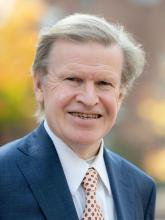You are here
Europe’s high noon
Apr 07,2024 - Last updated at Apr 07,2024
BERLIN — Democracies tend to struggle with security challenges. That was the context that led W.H. Auden to call the 1930s a “low dishonest decade”, a description that seems to apply to our own.
Now, as then, political posturing is easier than persuasion. Yet persuasion is what one needs to build alliances, galvanise support and preserve international stability. With Ukraine depleted and overstretched, and with Russia posing a security threat to the Baltics and Europe more broadly, diplomatic and strategic coordination is more necessary than it has been since the end of the Cold War. Yet despite the high stakes, Western leaders look weak and divided. Their 1930s equivalents, French Prime Minister Édouard Daladier and British Prime Minister Neville Chamberlain, appear less pathetic in comparison.
In Germany, Chancellor Olaf Scholz has endured blistering attacks from his own coalition partners over his muddled, incoherent explanation of why he will not furnish Ukraine with Taurus missiles. At the beginning of the war, he memorably spoke of a historical turning point, a Zeitenwende. But he has largely stuck to business as usual. Sometimes, it looks as if the only politician who will defend him is the pro-Russia right-wing leader Alice Weidel.
Equally reminiscent of the 1930s is the response to French President Emmanuel Macron’s refusal to rule out sending French troops to Ukraine. Dissident (and sometimes Russophile) voices counter that France is not prepared. Similarly, in the face of obvious security threats from Nazi Germany early in World War II, a wide range of French opinion shapers asked why they should be expected to die for Danzig (now Gdansk, Poland): “Mourir pour Dantzig?”
Like Macron, British Prime Minister Rishi Sunak has the right instincts. But he is crippled by his unpopularity within his own party and by the certainty that he will soon lose an election. Meanwhile, US President Joe Biden is facing a wave of American isolationist sentiment, both from left-wing Democrats and from a Republican Party that has been remolded by Donald Trump.
Politicians in the 1930s at least had good excuses for their weakness. Their countries were exhausted and depleted from the Great Depression, and many of them vividly recalled the appalling sacrifices and losses of World War I. Today’s isolationists have no such frame of reference.
Ukrainians remain deeply committed to defending democracy and the principles of self-determination and political freedom. But in western Europe and the United States, the initial emotional willingness to support their fight has not translated into sustained, effective assistance. Ukraine thus finds itself in the position of the anti-Mafia prosecutor and judge Giovanni Falcone, whose life and martyrdom are retold by the Italian journalist Roberto Saviano in his novel Solo è il coraggio: “Lonely Is the Courage.”
Of course, it is not easy to build a democratic consensus for necessary but risky actions. Tellingly, High Noon, the 1952 movie starring Gary Cooper as a lone sheriff confronting a group of bandits, became an iconic cultural reference for Poland’s pro-democracy movement in 1989.
The most consistently courageous voice in Europe nowadays seems to be that of European Commission President Ursula von der Leyen. There may be an institutional reason for that. To the extent that the Commission is insulated from the day-to-day need to forge political compromises in complex parliamentary settings, it can ignore the powerful short-term pressures that invariably shape democratic policymaking.
This gives von der Leyen an opportunity to redress a profound flaw in Europe’s institutional design. Following the collapse of communism and the breakup of the Soviet Union, Scholz’s predecessor, Helmut Kohl, and French President François Mitterrand saw that a historic step was needed. The most obvious move would have been to make Europe a coherent security player with its own army. But defence lobbies in the major countries, fearing that they would lose out, blocked the scheme. The big, historic gesture would have to take a different form.
European leaders thus opted for the move towards monetary union and, eventually, the creation of the euro. The decisive European Council meeting in December 1991 that opened the door to monetary union occurred just a day after another agreement that is now almost forgotten. At Viskuli (near the Belovezha Forest in Belarus), the three largest components of the Soviet Union, Belarus, the Russian Federation and Ukraine, agreed to end the Union Treaty of 1922. With that, the Soviet implosion seemed complete, and any security threat from Russia less urgent. Europe could calmly proceed with its monetary unification.
But the monetary union was strikingly incomplete, as Kohl and Mitterrand knew, and Europeans have spent the past decade debating how to augment the economic side of the arrangement with a capital-markets union, a banking union, and even a social-security union (something Scholz was enthusiastic about, for a time). But now, priorities have changed. The most urgent task is to correct for the failed response to the Belovezha Accords with an energy union and a military or security union.
Thirty-five years after the decisive Polish election that ended communism in the country, Europe is facing its own High Noon. If Trump wins in November, Europe really could be alone in the world. The movie’s opening song, “If I’m a man, I must be brave,” should be the theme of a new security-building coalition in the June European Parliament elections. European leaders can take inspiration from real-world heroes like Falcone.
Harold James, professor of History and International Affairs at Princeton University, is the author of “The War of Words: A Glossary of Globalisation” (Yale University Press, 2021). Copyright: Project Syndicate, 2024. www.project-syndicate.org













Add new comment